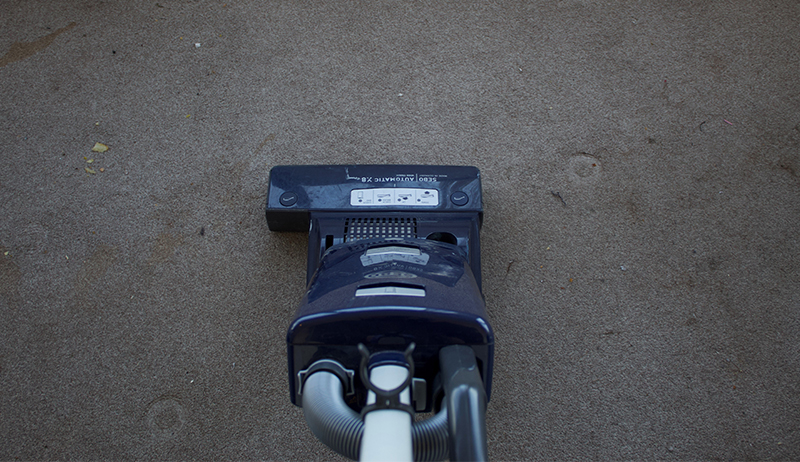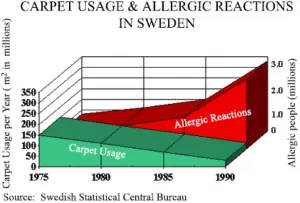
Are Hard Floors Healthier Than Carpet?
What you need to know about carpet and hard floors if you have allergies
There is an interesting study from Sweden on this subject. Apparently, in 1975, Sweden made a huge push to remove carpets in an effort to reduce allergens and allergies in the country – did this prove successful?
Many blamed carpet as the culprit for many allergy sufferers. They suggested that the carpet was often dirty and thus contributed to poor indoor air quality.
The Carpet and Rug Institute (CRI) states:
- There is no scientific study linking the rise of allergy and asthma to the use of carpets. Indeed, several studies actually disprove any correlation.
- A 15-year Swedish study found no link between carpet usage and the incidence of allergy or asthma. In fact, when carpet usage in Sweden decreased by 70% allergy reactions in the general population increased by 30%.
- An 18 nation study of nearly 20,000 people found a statistical relationship between carpeted bedrooms and reduced asthma symptoms and bronchial responsiveness.
- A 2003 study of more than 4,600 school children in New Jersey found that having carpet in a child’s bedroom was associated with fewer missed school days and less need for asthma medication. If carpet helped the children, it can certainly help adults in the same household as well.
- A possible explanation is that carpets act as a filter, trapping allergens away from the breathing zone so they can be removed through proper vacuuming and deep cleaning extraction. For best results in removing pollutants trapped in carpet, use a vacuum cleaner with S-Class filtration such as SEBO.
Interestingly, a fact that allergic reactions and other illnesses blamed on the carpet in homes and facilities went up dramatically after the carpet had been removed.
The following chart illustrates what happened in Sweden when carpets were removed from buildings over the years Vs the number of people that suffer from allergies.
Sweden has become a nation consuming less and less carpet since 1975, at the same time, suffering more and more from what was originally blamed on the carpet.
When you analyze and compare all living conditions in today’s world, carpet actually makes a healthier home or facility. You don’t have the dust load in the air as you do with hard floors – all things being equal, of course, and cleaned accordingly.
Dust mites and pet dander are often blamed for allergic reactions. Both can build up in carpet, and both can be found on hard floors. We won’t even go into tobacco smoke, pollution from vehicles, pollens and more.
When a carpet is used within a home or building, with regular thorough vacuum cleaning, along with a regular soft furnishings cleaning maintenance programme, this keeps allergen levels very low.
For hard floors, the proper dusting and mopping system is important. With just a small amount of air movement on a hard floor, allergens are swept up into the air and into the respiratory systems of occupants.
Potential carpet problems
Many people make the statement that carpet is a sink and thus traps and holds potentially dangerous contaminants. Whilst this statement is true to some degree, it’s also a good quality carpet.
With carpet, the fibres act as a filter and hold onto contaminants until they can be vacuumed or cleaned – hard floors do not do this.
One way to see this for yourself is to watch the air in a home when the sun is shining through a window. With clean, carpeted floors you see a small amount of dust in the air, not much. Whereas in a home with hard floors, you see much more dust because there is less surface in the home that holds onto dust. So, you have two options:
- Have carpet in your home, this will hold onto contaminants, keeping them away from your breathing space, removing these with a regular and thorough vacuuming.
- Have hard floors in your home, which do not hold onto contaminants but instead allows them to move freely in the air, possibly triggering an allergic reaction.
It could also be argued that whilst not only healthier for occupants, a carpet also makes a safer home or facility. There are fewer trip and fall accidents on carpeted surfaces and if something is spilt, less chance of slipping as opposed to a hard floor surface.
Carpet and mould
Can mould grow on carpet? Absolutely! Mould can grow on all surfaces.
Mould needs a food source, moisture, warm temperature and typically a dark place to live.
Mould does not use carpets as a food source, today’s carpets, are mostly manufactured using synthetic materials.
Mould has no appetite for these materials. Mould, however, will eat contaminants in carpet, so if a carpet is damaged by floodwater, sewage etc and not remediated properly, mould can grow on it. It’s worth noting that mould will also grow on walls, concrete, soft furnishings and hard floors.
Carpet and off-gassing
Carpet is no more of a problem for chemical reaction than any other product on the market today.
Some claim that carpet off-gases fume like formaldehyde. The carpet industry guarantees that formaldehyde is not used in the manufacturing of carpet and that carpet does not off-gas even the smallest amounts o formaldehyde.
People then blame the latex in the carpet, saying they have an allergic reaction to the natural gleis in the carpet. Problem is that latex in today’s carpets is also synthetic, which studies suggest does not contribute to allergic reactions.
Weighing up the pros and cons
The best thing to do when it comes to deciding which type of flooring to install is to think about how it is going to be used. If you want a comfortable, quiet atmosphere (and a healthy one too) then a carpet is the right choice. Remember though, to thoroughly vacuum this on a regular basis, preferably an upright vacuum cleaner with a brush bar to agitate and remove all dry dirt and any pollutants that may have been filtered through the carpet.
Are Hard Floors Healthier Than Carpet?
Quite simply – No!










